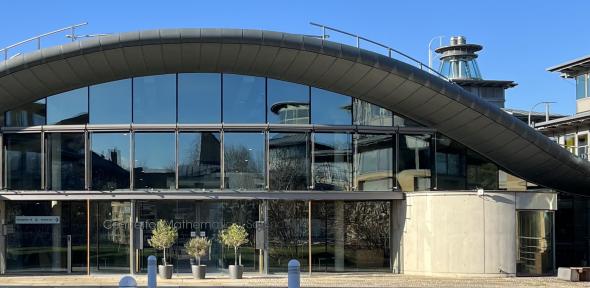
Across the University, Cambridge’s world-leading researchers are exploring how AI can benefit society. Research in the mathematics departments is demonstrating how AI can help us all, from improving healthcare and public services to tackling climate change.
The potential offered by developments in AI and machine learning to revolutionise our lives is huge. And from Alan Turing’s foundational work onwards, Cambridge mathematicians are playing a crucial part.
Today, researchers in the mathematics departments are collaborating across multiple sectors of society to explore ways of deploying AI and machine learning for real-world benefit, and to work out how to overcome the challenges that run alongside this huge opportunity.
Researchers in the Mathematics departments are working with clinicians and patients to improve healthcare services, collaborating with industry to gather real-world data that in turn informs future development and delivery, and building better climate models to help policy makers and society understand and address the climate changes facing our planet.
In this video, Professor Sir John Aston FRS, Harding Professor of Statistics in Public Life in the Department of Pure Mathematics and Mathematical Statistics, and Pro-Vice Chancellor for Research, reflects on how Cambridge is exploring opportunities to unlock AI's potential for social and public benefit.
Discover more about some of the ways research in the Mathematics departments aims to make a difference - for all of our futures - through the examples below:
Blood Counts - unlocking the potential of data for patient benefit
In January 2025, senior UK Government minister the Rt Hon Pat McFadden MP met Carola-Bibiane Schönlieb, Professor of Applied Mathematics in the Department of Applied Mathematics and Theoretical Physics. The discussion was part of the minister's visit to Cambridge to explore the rapidly-developing ways in which the University's AI research, and the DAWN AI supercomputer, are driving improvements in public services and healthcare.
Together with Dr Suthesh Sivapalaratnam (Barts Health NHS Trust and Chief Medical Officer for Blood Counts), Carola-Bibiane Schönlieb explained the work being carried out through the Blood Counts project.
The interdisciplinary Blood Counts collaboration - one of the largest-scale applications yet of machine learning in medicine and healthcare - harnesses AI to revolutionise disease detection. The project provides an early warning system for infectious diseases, improving public health responses across the NHS.
Read more about the Blood Counts! project in our feature article Unlocking the potential of blood tests through AI
Addressing human-centric challenges: the Centre for AI in Medicine
Artificial intelligence and machine learning have the potential to help address some of the most intractable problems in biomedical science, turbocharge medical discovery and revolutionise healthcare delivery. In 2020, Cambridge established a multidisciplinary Centre for AI in Medicine (CCAIM) with the ambition of developing novel AI and machine learning technologies to support these aims.
CCAIM is hosted in DAMTP, and led by Professor Mihaela van der Schaar as Co-Director and AI lead. The Centre brings together researchers, clinicians and experts from machine learning, science and medicine, and collaborates closely with industry.
In expert evidence to the UK Parliament’s Science and Technology Committee in 2023, Mihaela van der Schaar spoke about the opportunities, challenges and limitations posed by AI. This includes the potential to "[use] AI to prevent disease, to make sure that we identify early disease and, if a patient develops a particular disease, gets the right intervention at the right time in the right location and according to their wishes". In particular, her expert contribution focused on the need and challenges of developing "AI that can operate effectively, accountably and reliably in the real world and which focuses on problems that are human-centric and messy."
You can discover more about some of Professor Mihaela van der Schaar's recent AI research in this Faculty news article, and discover more about the work of the Centre for AI in Medicine in this University feature.
Transforming climate modelling with the latest machine learning tools
Across Cambridge, researchers are harnessing the potential of AI and machine learning to transform climate and biodiversity research.
Research software engineers at the multi-disciplinary Institute of Computing for Climate Science, based in the Department of Applied Mathematics and Theoretical Physics, are working on software that bridges the gap between traditional climate models and the latest machine learning tools.
This breakthrough is improving climate predictions by better representing small-scale processes that are challenging to capture in models. The software is now used by major institutions, including the National Center for Atmospheric Research, to enhance climate simulations and inform global policy.
Read more in this University of Cambridge feature, and discover more about the mission and work of the Institute of Computing for Climate Science in our Faculty article.
